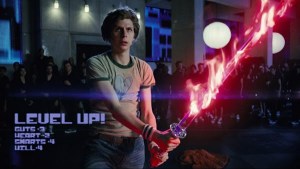Originally Posted August 14th, 2010
When you’ve grown up in a word of arcades and consoles, it’s sometimes easy to forget how weird many of the basic concepts of gaming are. Mario is a series about an overweight plumber jumping on the heads of giant mushrooms and turning them into coins. Pac-man has you guiding a yellow circle with a flapping mouth through a maze to collect pellets and fruit, while being chased by a quartet of colourful ghosts. Much in the same vein, early comic book idiosyncrasies eventually became core elements of the medium: visual cues for sound appear out of thin air, and gigantic blocks of text hang in the middle of scenes, yet somehow don’t disrupt it. You may not notice how experimental some of these fundamental mechanics are until you see them applied in a different medium. Scott Pilgrim vs. the World is a patchwork of such elements, set in a world that’s equal parts Nintendo and Marvel. Physical actions are punctuated by BAMS and POWS, and pocket change pops out of broken thugs instead of bones. The absurdity of video game logic playing out as a living comic book is never of question in Scott Pilgrim, you're either on its level or left in the dust, making for an unapologetically niche, but vibrant tribute to these past times.

Set in the fantastical realm of Toronto, Canada, thefilm follows the turbulent love life of the titular Scott Pilgrim (Michael Cera). Scott is a twenty-three year-old college grad coasting through life, in a band, but out of work, and spending most of his time hanging out with his band mates, or his new (and much younger) girlfriend. Still reeling from the heartbreak of his last relationship, Scott is content to simply spin his wheels until a mysterious American-Ninja rollerblade delivery-girl begins using his head as a subspace highway (stay with me here). He quickly becomes infatuated with the girl, Ramona Flowers (Mary Elizabeth Winstead), and as twee romance takes hold of the two, Ramona’s past comes back to haunt Scott in the form of evil exes. See, Ramona’s past lovers have formed a league of evil ex-boyfriends, seven in all, who seek to destroy Pilgrim using kung-fu, mystical powers and veganism (which, unlike ovo-lacto vegetarianism, bestows immense psychic powers). Scott’s wiry frame hides his incredible fighting prowess and so he steps up to dismantle Ramona’s old flames by using his fists, his wits, and the unstoppable force that is a three-piece indie band.
So, Scott Pilgrim is basically a romantic comedy, just one that's spent all its quarters for sanity meds on arcade tokens instead. The world of Scott Pilgrim is an 8-bit one, even though those are real people you’re watching. Based on the comic series by Bryan Lee O’Malley, Pilgrim’s world is much like our own, only it’s been run through a Nintendo cartridge a couple of times times. Scott earns points for daily activities, and even levels up at key moments. In Scott’s world, 1-ups wait for those who earn them and people can store five foot sledgehammers in a purse, Granny tweety-style. There is absolutely ZERO explanation given as to how such a world functions and, you'll either buy the bit and premise, or you won't. The film doesn’t stop for anything, and while it doesn’t take anything too seriously, the interpretive physics and wire-fighting are played straight, without ever seeming like some sort of parody. The nonchalance everyone shows for flaming katanas and lesbian ninjas lets you know that this world doesn’t care why such things exist, so why should you? O'Malley's knack for blending fan-boy absurdity with the everyday makes for a terrific blend on film; wouldn't every bad date movie find just a little life by throwing in some pyrotechnics for no reason?

While the rules are more or less game-based, director Edgar Wright presents his adaptation as if the viewer is watching a comic book in motion. There are many, many comic book movies out there, but most are a translation of the story instead of the way it gets told. With Pilgrim, Wright has made a movie that feels like a comic book come to life. Shot changes feel like moving to another panel and each scene transition plays like a turning of the page. Most shots are accentuated with little comic book elements ranging from visual onomatopoeia, to HUDs showing vital character statistics. It’s a real treat for the eyes, one that will no doubt benefit from multiple viewings in order to soak up all the hidden Easter eggs. The whole movie is structured like a video game and as Scott’s trials increase in difficulty, so too does the insanity.
It’s not long before the fist-fights become bass battles and sword clashes, which can be a lot to handle. The escalation can lead to fatigue before even half the exes are dispatched of, and the film sags during the second act. Yet every fight brings something new and fresh to the experience, leaving the viewer excitedly waiting to see what’s in store for the next brawl. And it’s during these intense sequences that director Wright really shows his talent for filming complex action, which was hinted at by the 30-minute shootout that capped off his last film, Hot Fuzz. Wright’s always had known how to inject energy into mundane tasks (a trademark he takes time to skewer here) but hasn’t had a chance until now to go all out. Here, his highly kinetic filmmaking is applied to a property that needs a lot of energy, and the results are impressive.

Despite weighing all of 120 pounds, Scott is a 1st class ass-kicker, and Wright’s willingness to go over the top fits in perfectly with the material. Scott will be fighting more than half a dozen foes at one time but the action is never cluttered because the choreography is so well thought out. Most fights contain extensive shots where you can visibly see Cera belting out and taking shots, and you never feel like you’re just watching a stunt double. Even when a battle between the anime avatars of rock sub-genres breaks out, Wright’s measured approach to chaos makes the mayhem effortlessly watchable. As an action picture, Pilgrim is a winner because instead of trying to walk the tight-rope of plausibility, it says “to hell with it”, and instead focuses on being as crazy as possible, back flipping and roundhouse kicking all the while.
Yet, Scott Pilgrim’s success as a comic book/video game come to life means it has substantially more difficulty with an area that is a pitfall for both mediums: character. While O’Malley’s creations are endearing in print, on the big screen, they feel far more two-dimensional. There’s an uncanny valley to real people acting like cartoon characters that’s a bit jarring at first, and the only way to get over it is to realize that these aren’t people you’re watching, but instead the kind of broad archetypes you would find in a comic book. There’s a distinct lack of depth to everyone, including Scott, which makes the introspective elements of the story feel hollow. In fact, the central romance between Scott and Ramona seems incredibly dysfunctional, with Scott being inexplicably obsessed with a girl who’s consistently cold and fickle. Then there’s the treatment of Scott’s high school girlfriend, the inventively named Knives Chau (Ellen Wong). Scott thoroughly mistreats her, an addition to the film not found in the books, and the resolution to their relationship is rushed, leaving you thinking of Scott as kind of a dick.

The lack of depth in the characters will be exacerbated for some people by the film's overt "hipness." Remember, this is a film about young twenty somethings in Toronto, where seemingly everyone is in a band, and the dress code is strictly value village/Urban Outfitters. Be prepared for dialogue that’s steeped in irony and sarcasm, though it helps that its often very funny all the same. Despite its more youthful sensibilities, the complete lack of self-seriousness lets the actor’s words come off as light-hearted and goofy as opposed to obnoxious. A lot of that is due to the fact that the massive ensemble cast is excellent all the way through. Between its two leads, seven villains and a dozen other supporting characters, Pilgrim is bursting with charming and memorable performances that stay true to the source material, which is especially impressive since some characters are on screen for less than five minutes. Stand outs from the supporting cast include Anna Kendrick as Scott’s know-it-all sister, and Kieran Culkin as Scott’s exuberantly gay and equally hilarious roommate. Mary Elizabeth Winstead is perfectly mysterious as Ramona, which makes it a shame she doesn’t have more to do here. But the real star is Cera as Pilgrim, and if anything is going to convince people that he has a future as an actor, this is it. Breaking out of his more nebbish roles, Cera is playing the hero here, one you mostly want to root for, despite his shortcomings. About the highest compliment I can give him is that at no point did a think I was watching Michael Cera, which is a pretty damn big step forward.
There’s really no other movie out there quite like Scott Pilgrim vs. the World. While it may fall short as a love story of fully realized characters, the film manages to create a world of such imagination and energy that it’s almost impossible not to get swept up in it. Staying true to its niche spirit, the movie never settles for broad appeal and knows what it wants to be: a tribute to the wonderfully weird worlds of video games and comic books.
4 out of 5
Directed by Edgar Wright
2010, USA

